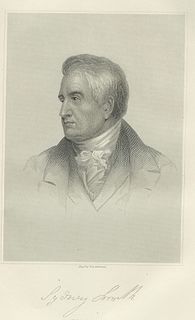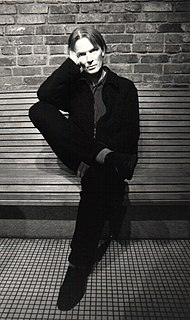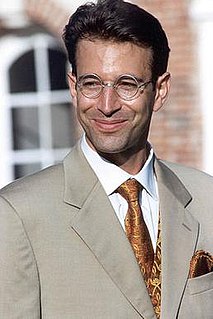A Quote by Sydney Smith
Bishop Berkeley destroyed this world in one volume octavo; and nothing remained, after his time, but mind; which experienced a similar fate from the hand of Mr. Hume in 1737.
Related Quotes
After we came out of the church, we stood talking for some time together of Bishop Berkeley's ingenious sophistry to prove the non-existence of matter, and that every thing in the universe is merely ideal. I observed, that though we are satisfied his doctrine is not true, it is impossible to refute it. I never shall forget the alacrity with which Johnson answered, striking his foot with mighty force against a large stone, till he rebounded from it, "I refute it thus."
There are four simple ways for the observant to tell Mr. Croup and Mr. Vandemar apart: first, Mr. Vandemar is two and a half heads taller than Mr. Croup; second, Mr. Croup has eyes of a faded china blue, while Mr. Vandemar's eyes are brown; third, while Mr. Vandemar fashioned the rings he wears on his right hand out of the skulls of four ravens, Mr. Croup has no obvious jewelery; fourth, Mr. Croup likes words, while Mr. Vandemar is always hungry. Also, they look nothing at all alike.
The book I'm looking for,' says the blurred figure, who holds out a volume similar to yours, 'is the one that gives the sense of the world after the end of the world, the sense that the world is the end of everything that there is in the world, that the only thing there is in the world is the end of the world.
He wanted nothing, for the time being, except to understand .... Without advice, assistance or plan, he began reading an incongruous assortment of books; he would find some passage which he could not understand in one book, and he would get another on that subject .... There was no order in his reading; but there was order in what remained of it in his mind.
Billy was fascinated by the television. At its most basic level, it occupied his time and shut out the demons of isolation. This was another irony because, for so long, he had shunned the tube for a similar purpose-to prevent it from bombarding his brain with demons of banality. However, each time he turned the machine on, he began to discover a world of assorted delights, as well as gain insight into the insidious manner in which this medium was shaping the mass psyche. If nothing else, he learned there was nothing innocuous about it.
In one of the most brilliant papers in the English language Hume made it clear that what we speak of as 'causality' is nothing more than the phenomenon of repetition. When we mix sulphur with saltpeter and charcoal we always get gunpowder. This is true of every event subsumed by a causal law in other words, everything which can be called scientific knowledge. "It is custom which rules ," Hume said, and in that one sentence undermined both science and philosophy .
It is my mind, with its store of images, that gives the world colour and sound; and that supremely real and rational certainty which I call "experience" is, in its most simple form, an exceedingly complicated structure of mental images. Thus there is, in a certain sense, nothing that is directly experienced except the mind itself. Everything is mediated through the mind.
When the Congress first met, Mr. Cushing made a motion that it should be opened with prayer . . . Mr. Samuel Adams arose and said he was no bigot, and could hear a prayer from a gentleman of piety and virtue, who was at the same time a friend to his country. He . . . had heard that Mr. Duche . . . deserved that character and therefore he moved that Mr. Duche . . . might be desired to read prayers to the Congress . . . . After (he read several prayers), Mr. Duche, unexpected to everybody, struck out into an extemporary prayer, which filled the bosom of every man present.
Antonio Stradivari of Cremona, Italy, made about 1,200 violins, half of which still survive. After his death in 1737, factories churned out hundreds of thousands of copies. And every day, people bring violins with Stradivarius labels to appraisers, thinking they have bought the genuine article for a song.
You might get rid of the Bishop and get to the local Ku Klux Klan leader. That, on the whole, has been the fate of certain types of Protestantism. They get under the control of a White Citizens Council while the Catholic Church has an authoritarian system, yes, in which the Bishop expresses the conscience of the whole Christian community and they say there are some things that you can't do on this matter.






































